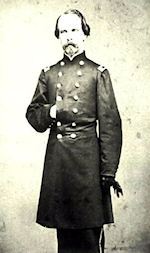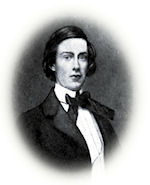Headquarters Second Brigade,
Hilton Head, S. C.
November 13th, 1861.
My dear Mother:
I am delighted, after several busy days, once more to have an opportunity to quiet the uneasiness of your anxious heart, and assure you of my continued welfare. We are now fairly ensconced on South Carolina soil. Our headquarters are at an old wooden building innocent of paint, but rendered interesting by a large hole in the side, caused by the passage of one of our shot. These were pleasant places that the planters have abandoned us, and though conscious that our victory has been glorious, and that a heavy blow has been struck, would to God that this war had never visited us, and that the planters were once more peacefully cultivating their pleasant homes. The country for many miles around has fallen into the hands of our armies, and, unhappily, victors are apt to be ruthless in destroying the property of conquered enemies.
However, the season of pillage is almost over. Our camps are being well guarded, and the opportunities for the escape of straggling parties of marauders have ceased. Every effort has been made to check wanton excesses, and it has been made for a few days past almost the sole duty of the Aides to scour the country for the purpose of intercepting parties wandering about without proper authority. In this manner I have come to see something of neighboring plantations, which are among the wealthiest in South Carolina.
I wrote you before that here lived the Pinckneys, the Popes, a gentleman named Jenkins-Stoney, and others whose names may or may not be familiar to you. Their houses are in the old fashioned Southern mansion style, and show evidences of luxury and comfort.
By-the-way, I saw a letter from a Secession soldier named Lusk the other day, which dilated much on the justice of the Southern cause, and the certainty that God would give the South the victory. I hear there is, or was previous to our arrival, a large family of Lusks at Beaufort, a few miles distant. I regret to say that the letter I have mentioned did not show the writer to have displayed any great diligence in studying his spelling-book in the days of early youth. The weather here is warm as summer. Oranges hang still in ripe profusion on the trees, the cotton remains unpicked, and the corn remains for us to gather. Negroes crowd in swarms to our lines, happy in the thought of freedom, dancing, singing, void of care, and vainly dreaming that all toil is in future to be spared, and that henceforth they are to lead that life of lazy idleness which forms the Nigger’s Paradise. I fear that before long they have passed only from the hands of one taskmaster into the hands of another.
All this long time I get no news from home, and am eagerly, impatiently, awaiting the advent of the mail which is to recompense for the long weeks of waiting. I may write very irregularly, as my time was never so little my own as now. I think, when the “Vanderbilt” returns, you will see my old school friend Sandford, who will bear you news of me. Sandford is a young fellow, of the family of the name, so extensively engaged in shipping interests. I mention this as possibly Uncle Phelps may know of them. Have Lilly and Tom any intention of soon being married? I send by Sandford a hundred dollars of my pay home to be delivered to Uncle Phelps, and would like $25.00 of it to be expended in buying Lilly, when the wedding day comes, some remembrance from brother Will. I enclose in this letter a $5.00 bill to be especially employed in the purchase of toys for the children. I would like much to see little Willie and Turlie once more. If I possibly can, I shall try and get a leave of absence about Christmas time, though I hardly expect to be successful. Walter, I suppose, is fairly home by this time. I would have written before, congratulating him upon the arrival of his little boy, but have been waiting to get hold of the letter which announces it. Beyond the fact that he is a father I know nothing.
Give love to all my friends, and all who feel an interest in me. I would like to see you soon again, which, in fact, is the burthen of all the Southern letters we have intercepted. There is one thing very conspicuous in all letters from Southern soldiers. I refer to the deep religious vein pervading them. Their religious impressions seem to be warmer than those of our troops. One poor fellow fears their cause is doomed because of the fearful immorality in their ranks. “Why,” he writes, “I even hear that officers have been known to curse the men under their command.”
Good-bye,
Very Affec’y.,
Will.




